Читать книгу Essentials of Social Emotional Learning (SEL) - Donna Lord Black - Страница 57
Rapid Reference 2.6 Comer School Development Program
ОглавлениеThe Comer School Development Program (SDP) was founded in 1968 by child psychiatrist James Comer and his colleagues at the Yale Child Study Center. The program began as a collaboration between the Yale Child Study Center and the New Haven Public Schools and was originally named the New Haven Intervention Project. Its purpose was to improve the educational experiences for students attending the two poorest performing schools in New Haven, Connecticut (Panjwani, 2011).
Comer and his colleagues from Yale began exploring critical issues that might explain why these schools were failing, and during the process, they soon discovered that the primary reason for the failures was because the schools were focusing on the teaching of academic material and not on teaching the whole child. Comer and his team believed that the schools’ educational model was more of a business model with a primary goal of teaching students the academic material so they could graduate from school, rather than on developing the skills the students would need for life. A new model was introduced for the schools in which it was hypothesized that changing the learning environment would positively influence outcomes for students and for the schools. In short, Comer and his colleagues theorized that implementation of the School Development Program would transform the schools into learning environments that built positive interpersonal relationships, promoted teacher efficacy, fostered positive student attitudes, increased students’ pro‐social behaviors, and improved student academic achievement (Lunenburg, 2011).
The model was implemented with the formation of a school government and management team consisting of the school’s principal, elected teacher and parent representatives, and a mental health worker from the Yale Child Study Center. The function of the management team was not only to make decisions about the school’s academic program, but also to make decisions about the school’s social and extracurricular programs.
This principal‐led, shared‐management framework became the fundamental basis for the program and encouraged teacher and parent involvement in the decision‐making processes of the school. Higher academic achievement was an emphasis of the program, as was students’ psychosocial development. Key concepts in the program included expectations for caring and sensitive relationships between staff and students, high expectations for achievement, no excuses for poor performance or bad behavior (e.g., no blame on poverty or neglect), and the development of a wholesome school climate or learning environment that included preserving the building’s physical appearance. Teachers were encouraged to be involved in the collaborative decision‐making process, were shown respect and appreciation, and were discouraged from placing blame on others. Students were to be given fair and equal treatment and equal access to resources, including supports from psychologists, social workers, and counselors. Guiding principles for students included expectations for order and discipline, as well as for treating one another with kindness, respect, and trust. Social skills were taught to students and modeled by staff. Parental involvement was encouraged and expected, and classes for parents focused on teaching about how their children learned and how to be involved in their child’s education.
Comer and the Yale Child Study Center remained a part of the New Haven elementary schools until 1980, at which time the original problems had become a thing of the past. After many years of implementing Comer’s SDP, the performance of the two elementary schools rivaled that of the highest income schools and had better attendance, better grades, and fewer behavior problems. While the program was originally designed for implementation in elementary schools, it quickly was adapted to meet the needs of middle and high schools as well.
Since its development in 1968, the Comer SDP has been implemented in more than 1,000 schools in the United States and other countries, including South Africa, England, and Ireland. It has been used as a framework for system‐wide reform and has had a profound effect on thousands of students, with improvements demonstrated in both academic and social performance.
James Comer’s work on improving the scholastic performance of children from lower income and minority backgrounds has earned him much recognition, and the program he developed continues to be recognized as a research‐based, comprehensive reform program for K–12 schools.
Source : Adapted from Wikipedia. (2020). James P. Comer. https://en.wikipedia.org/w/index.php?title=James_P._Comer&oldid=938362178. Licensed under CC BY‐SA 3.0.
Later, in the 1980s, two new figures emerged in the field—Yale psychology professor Roger Weissberg and his student Timothy Shriver. Together they implemented a social development program in the New Haven Public Schools. At about that same time, Weissberg joined with another psychology professor at Rutgers University, Maurice Elias, to develop a framework for incorporating SEL into schools. Elias’s leadership and research in this area had provided a greater understanding of the importance of SEL in educating the whole child, and as director of the Social Emotional Learning Lab at Rutgers University, Elias had become a prominent leader in the field. Then in 1994, Elias and Weissberg joined with other prominent researchers in the field to help form CASEL, the Collaborative for Advancing Social Emotional Learning, which was later changed in 2001 to the Collaborative for Academic, Social, and Emotional Learning.
Elias and Weissberg later collaborated with seven other authors to coauthor Promoting Social and Emotional Learning: Guidelines for Educators. The publication of this book by the ASCD in 1997 established and defined the field of SEL. However, it wasn’t until the release of Daniel Goleman’s previously mentioned book on emotional intelligence that the concept of SEL became prominent in popular culture.
